#Empathy (Reprise)
Text
Let’s talk about the Watch What Happens (reprise) and why Only Davey could’ve sang it.
Like at this point they’re pushing the Katherine and Jack agenda, why shouldn’t she be his inspiration to keep going in this moment???
And the answer is cause she can’t grasp the situation fully!!!
Let me make it very clear that this is Not Katherine slander. I love her. I think this scene highlights the differences in their struggles and upbringing in a really brilliant way.
When she sees Jack wants to quit in this scene she’s so harsh with him. Doesn’t try to empathize with his situation at all, wants him to just buck up and keep going! Because for her, in her situation, with her upbringing, that’s the only way to get anywhere! She wants to be a reporter? Well she can’t listen when she’s told no. She has to push ahead no matter what. She can’t show fear and she can’t show weakness cause she’ll be called a girl like it’s a bad thing and have it used against her. But she doesn’t see her privilege in this! That in coming from a rich powerful family her physical safety can not be put in jeopardy! Her worst case scenario is moving back home and having to deal with her family’s idea of what it means to be a women in this time period. And don’t get me wrong that’s horrible, it would be a terrible and unfair outcome.
But it doesn’t threaten her physical safety!! (Not to say this is true for all women in her position but the show paints a picture that her dad does genuinely love her in his extremely misguided way and we never see him threaten her physical well being or even to stop bank rolling her). She can’t understand that sometimes you need to let a fight pass you by to survive. She doesn’t understand what it really means for Crutchie to be in the Refuge until later. So she pushes hard and it would’ve just ended in a fight where her and Jack miss each other’s points entirely.
But Davey gets it. Maybe not to the extent Jack does, but Jack said it himself Davey’s dads physical safety being jeopardized at work has threatened his whole family’s housing and food security. Something that could’ve been prevented with a union. He knows that this isn’t safe, he fully grasps the danger they’re in, to an extent that Katherine can’t because she’s never threatened by it. Not really. For her and her rich friends she involves this could just be a pet project (she would never view it that way of course) but if this all goes pear shaped all she has to live with is the guilt not the consequences. Her life continues with maybe some delays depending how long her blacklisting lasts.
But for Davey this could be the choice that means they can’t afford food or can’t pay rent. This could be the choice that means Les can’t go to school and his dad doesn’t have a safe place to recover. He gets it, he matches Jack’s fear, but he can’t backdown when they’re making real changes that Jack is having a hard time seeing in the wake of losing Crutchie to an institution that is a large source of his trauma. He needed empathy and hope not an ass kicking and Davey delivered.
Without him that scene would’ve ended with Jack running away a lot sooner and a lot more permanently. Rant over. Hopefully this is semi-well articulated it’s late and I couldn’t sleep til I got this out.
#newsies rant#this is why I love javid sm too#and don’t really ship Katherine and Jack at all#they just have such a sibling ass kicking way of pushing each other#which they both need sometimes!!#but idk not enough empathy for me to ever ship them#the whole antagonistic flirting thing is just not for me#antagonistic besties on the other hand#there’s a reason you don’t send a boyfriend to do a best friends job#jack kelly#davey jacobs#katherine plumber#katherine pulitzer#livesies#watch what happens reprise#newsies#javid#just a lil#mine
84 notes
·
View notes
Text
just spent an hour telling my mom why heathers (the musical) is superior, actually, to mean girls (the musical) lmao
they are very similar in a lot of ways, but I do prefer heathers!
(she was texting to ask about the new mean girls movie lmao)
#I don't LOVE how the musical version romanticized JD a bit too much for my taste#but I love how much it humanized the minor characters like martha and heather mcnamara#and the music is great#I love a lot of its messages#like how when you're hurt you can try to make people hurt as much as you do#or you can try to make sure what happened to you doesn't happen to others#and it's easy to criticize a cycle of cruelty but anger won't be what fixes it#humility and kindness and empathy will be#reaching out to others will be#getting rid of heather chandler and JD wasn't going to fix what was a systemic problem#it was only reaching out to the marthas and the heather mcnamaras that was going to improve things#;;#plus dead girl walking (reprise) is one of the BANGERS of all time#I think if I'd been allowed to watch heathers (the movie) or the musical had been out when I was a teen#I would have been absolutely in love with veronica lmao
15 notes
·
View notes
Text
No, because people keep acting like Grace Chastity being consumed with a lust for the power that Lords in Black provided her doesn't count as a world ending Cataclysm - but it very much does. Not only has she shown little to no empathy for others throughout the entire show and only ever felt bad for lying to authority figures and being horny - but the final song of the Musical is essentially a reprise of Max's Murder Song/Manifesto which places her as a parallel to Max. Max sings about how he's going to kill ALL the Nerdy Prudes and not once but twice tells the audience that it doesn't matter if someone is actually a Nerdy Prude because he makes the rules and gets to decide who is or isn't a nerd etc etc. Grace's take is that she is going to kill all the Dirty Dudes but she's literally singing it to a guy who has, throughout the entire musical, done nothing to indicate he's a pervy/dirty dude and only kissed her after she asked him too. Like Max, Grace Chastity doesn't actually care if someone genuinely fits the framework of her stated victimology, because she has the power so she gets to make the rules.

Honestly it's like some people didn't think about the implications.
#npmd#starkid npmd#starkid#nerdy prudes must die#grace chasity#max jagerman#nerdy prudes spoilers#npmd spoilers#nerdy prudes must die spoilers#the guy who didn't like musicals#tgwdlm#black friday starkid#starkid musicals#hatchetfield#hatchetverse#hatchetfield musicals#nightmare time#dirty dudes must die#starkid theory#hatchetfield theory#the implications#Promise me you'll think about the implications
3K notes
·
View notes
Note
the fact that there wont be a reprisal of loser baby where angel takes back his acceptance of being constantly hurt and spews pure vitorial and anger at what has been done to him is the worst crime viv did in directing/greenlighting it
clown dick
That would imply a level of care and empathy that Viv just doesn't possess.
54 notes
·
View notes
Text
I defended Lom, but now I shall talk about Nuea
So...a lot of this is going to be a bit rant-y, because honestly there's some reactions that have been going on that really aggravate me. But I wanted to talk more about Nuea as a character in the show, and how I think he's being presented. You hear (for reasons unknown) a lot of discussion over how Lom is almost tricking Nuea by withholding the fact that his arrangement and marriage to Yiwa is in name only. I have so many problems with this read on the situation. While it is VERY common for BLs to use naivety as a trope, it's actually surprisingly rare to see from Mame. It's not one of her go-to's and so I was actually really surprised at how many people saw Nuea as 'innocent' (read virginal) or naive. We saw a similar reaction with Sky, this idea that he's an innocent little lamb, and I kind of figured that was because that's what Rain was. Rain was clearly modeled to be this sort of ingénue-style character, young, wide-eyed, innocent to an extent, but also experimental, not constrained by societal boundaries. But what the first encounter with Prapai showed was that he was not only not innocent, but experienced. Now granted many of his experiences were likely awful and traumatic, but Gun likely didn't got straight from 1 to 100, abusers rarely do, but there's also no clarity at all on whether Sky had any other intimate partners of his own choosing, whether a relationship or just another one-night stand. But circling back to my actual point, I think there are many viewers for which LITA was their first experience with Mame, and they believe Rain to be the blueprint for her 'bottoms' when in reality he's an outlier.
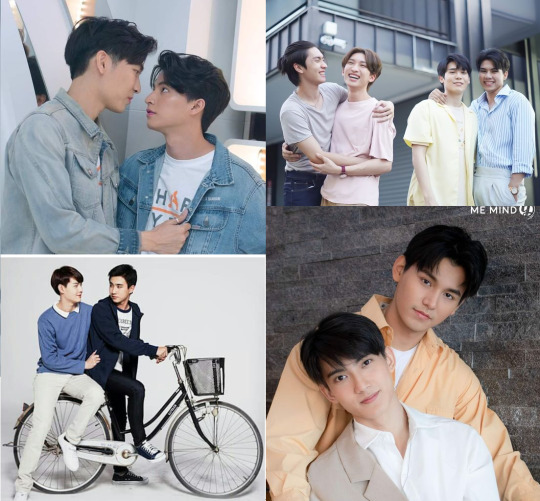
How this affects the perception of Nuea, is that since he is shown to be a fairly quiet, sensitive, kind person, some viewers began making assumptions. They assume that he's not physically experienced, that he's submissive, or even shy, and that's not really the case. We don't see much to indicate that at all in the show. He's very vocal for a lot of the show. He expresses his concerns to his boss freely, without concern for reprisal, and this certainly due at least in part to the type of boss she is, but even if she were some angry, obstinate crone, I doubt that would have stopped him. He's very vocal and honest in his conversations with Lom all through the series. He doesn't put up with any of Lom's rich/privileged BS. His kindness and empathy throughout is more a show of strength than anything. He's able to pretty easily get the results he wants without being rude, or mean. Even in his frustration with Lom, he's not vicious, but exasperated, reacting to Lom's childishness more like an exhausted nanny than anything else.
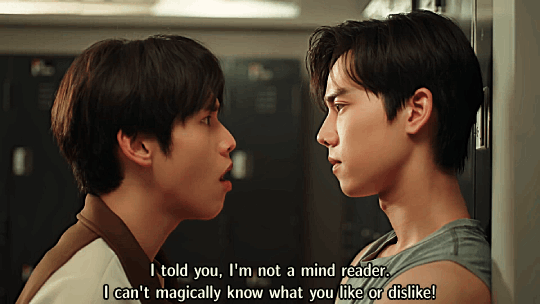
Nuea is confident, like really confident. He's confident in his abilities and skill at work. He's a confident gay man, he doesn't shy away from sex. His hesitation in regards to sleeping with Lom initially is based only on his knowledge of the likely fall-out (especially emotionally). Once we get to this most recent episode it's very clear that he has no hesitation in being an active and passionate partner.


I'm willing to bet after the absolute boss way that he shut down that shitty orchard customer, that we may see his confidence make an appearance next week in regards to Lom and Yiwa's mothers acting like petulant toddlers.
I think it's also important to remember that while he is younger than Lom (his actor is actually younger than ALL of the LITA boys), he's not actually all that young. While ages and timelines are pretty vague in the Mame-verse, Prapai should be about 30 in the Wedding Plan, and Lom is meant to have been his junior while they were getting their Masters, so he's probably 27-ish. Nuea, having attended university and worked as an event planner for several years is probably 25. He's not a child, and their age difference is practically negligible. Again, I feel this is an assumption based on the idea that LITA is the norm, when it's very much not. All of Mame's other main couples (in shows) have either been the same age, or with in a year or two of each other.

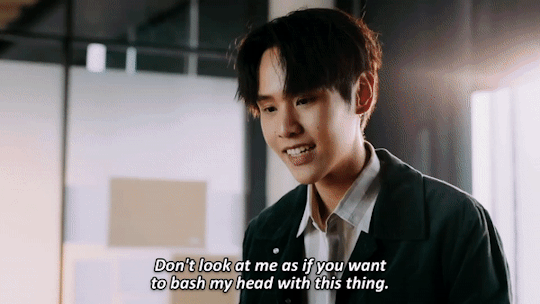
So while Lom may have some power/privilege over Nuea, it's very much situational and based on him being 'employed' by him, which is something that we as the audience know he could change if he really wanted to. We see that P'Im is more than willing to go to bat for her employees, Lom wouldn't be able to pull a Karen and get him fired, or forced to work with him. And while Lom is rich, Nuea's family has a generational business and owns a large amount of property. It's not the same level of rich by any means, Lom essentially has fuck you money, but it's still not like Nuea would be without resources and support if he chose to quit his job or leave Bangkok.
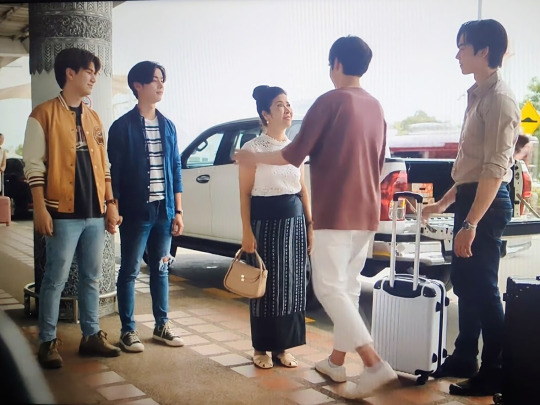
Also, the fact that he gets upset or cries over Lom, doesn't make him 'weak.' I've not heard anyone say that directly, but it's been implied. It's not weak for a man to be able to recognize and express his emotions. That's toxic masculinity bullshit, and we certainly don't want to be putting that pressure on characters that are actively defying it.
I guess in conclusion, my point is that Nuea is a bad-ass, the best kind of bad-ass even, one with a kind heart, and that he's more than capable of standing up for himself both in general and with Lom.
As a final note, what I realized watching episode 3 is that Lom 10000% has a competency kink, and further watching of the show only confirms that. He first encounters Nuea while he works at Pai's wedding and immediately begins lusting. The wedding suit try-ons where he looks at Nuea after learning he took pictures of each choice so that you don't have to try something on over and over again. He gets riled up watching him do the event where Payu proposes. He falls even harder watching Nuea put the creep in his place. Like...he just loves watching his man get shit done, and I respect (and understand) that.
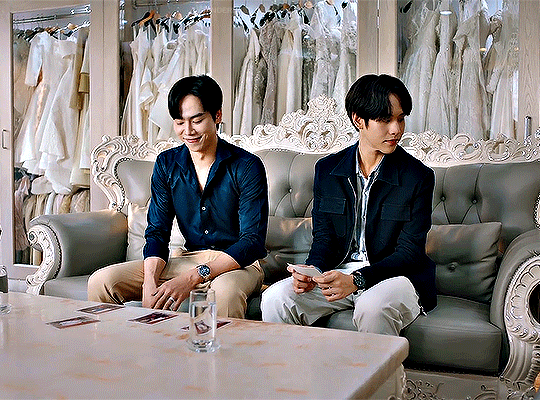

#Wedding Plan#Wedding Plan the series#Mame BL#LomNuea#NueaLom#Nuea x Lom#Lom x Nuea#Sunny Wannarat#Pak Naphat
82 notes
·
View notes
Text
To Those Left Behind: Answering the anger of the survivors in My Hero Academia vs. Hosoda Mamoru’s Belle
Yes, it's another "What [X] Did Right That BNHA Is Doing Wrong" post. I'm not trying to make this a series, but what's a girl to do when everywhere she looks, she sees other stories that are handling elements of BNHA's endgame with far more grace and rigor? Hit the jump.
The Formula: The Hero vs. The Critic
A bugbear of mine in superhero fiction is when The Hero is presented with someone critiquing their heroism who immediately revokes their objections when The Hero saves them in turn. The basic shape of the story is as follows:
The Hero is confronted by The Critic in some situation that lacks immediate danger. The Critic has issues with The Hero’s day-saving activities. Perhaps in some earlier battle between The Hero and Some Villain, The Critic suffered property damage; they might also be an innocent bystander (or relative thereof) who was harmed in the fight. They might simply be a stickler for laws The Hero may or may not be acting in accordance with. Perhaps they even take issue with the suffering Heroes themselves endure, though in the case of this specific storyline, they’re more likely to be thinking of a different Hero in their lives than the one they’re actually confronting.[1]
The Critic presents an obstacle to the combat-focused method that is superhero fiction’s default mode of conflict resolution. They may endanger The Hero’s activities by threatening legal/institutional reprisal, or they may just be there to make The Hero feel bad about themselves. The Critic may be framed very sympathetically by the story, or they might simply be a buzzkill, but regardless of the degree of empathy the story chooses to afford them, they are a hurdle to be overcome.
The Hero is unable to cogently argue for their own position because superhero narratives are not about offering real life justifications for vigilantism. Rather, because the default mode of conflict resolution in a superhero story is being a superhero, the story circumvents The Critic’s objections by placing them in danger, offering The Hero a chance to save them.
Having thus been personally saved by The Hero (or, to put it more cynically, having personally benefitted from what The Hero does), The Critic promptly gets over all of their objections, even the ones that seemed to have been founded in well-considered ethical frameworks rather than traumatic experiences.
1: “Hero’s civilian loved one has a problem with their heroics” is a whole different story! Typically that story is used to mine for drama in The Hero’s personal life; if it’s not there to serve as an ongoing relationship stressor, it’s more likely that the civilian loved one will get over their objections as a result of seeing The Hero save an uninvolved innocent than because they are themselves directly saved by The Hero.
This, to me, is simple sophistry. “You say you don’t approve of what my saving people costs, but what if I saved you, huh? Then would you like me?” is a cheap gotcha that relies on The Critic being incapable of separating rational ethics from their direct experience. That’s not to say that ethics shouldn’t have a foundation in lived experience, of course, but one also can’t de facto rely on one’s emotional responses to dangerous, traumatic situations to guide e.g. public policy. Emotional responses are not inherently fair; they can be myopic or prejudicial. For the same reasons of impaired partiality that guide judicial recusal or juror screening, a single personal experience with being saved by a superhero cannot be assumed to write superheroes a blank check for everything they do while in costume.
And yeah, I realize that I’m being ungenerous here. I assume that the storyline above is meant to be read as The Critic lacking sufficient empathy for those The Hero saves and coming to a greater understanding of the terror and desperate need experienced by bystanders when Some Villain attacks. I can understand the general thrust of things!
Still, that story structure does not require The Hero to grow—all they have to do is endure and keep doing what they’ve been doing all along. All the growth is experienced by The Critic as they’re led to empathize, not with The Hero, but rather with the other underdeveloped side characters—or more likely bit characters!—The Hero saves. And even that empathy is usually less spotlighted than The Critic’s gratitude, which can feel especially distasteful when it feels like the story is emphasizing how noble The Hero is for saving this jackass Critic that’s been giving them so many problems, and isn’t The Critic just so thankful now that they’ve been humbled and shown the error of their ways?
It’s not a story that, to my eye, usefully challenges The Hero or The Critic, merely a self-serving narrative that assures both The Hero and the audience that The Hero Was Right All Along. I can see the appeal of the “No, you move,” flat arc as much as the next person, but that story just feels like, if you’ll forgive my crudity, setting The Hero up for easily-earned asspats.
Let’s look at some different permutations of the formula as it appears in My Hero Academia.
The Critics of My Hero Academia
Over the course of its 400+ chapters, My Hero Academia portrays a lot of criticism of the state-sponsored Pro Hero industry the story depicts. There are people who criticize the laws that form the basis of professional heroics, people who think Heroes work too hard, people who think Heroes don’t work hard enough, people who think Heroes are too commercial, people who think Heroes are a shiny façade over a corrupt and ugly reality, people whose way of life has been ruined by the rise of Heroes, and on and on.
Unfailingly (and often to its considerable detriment), the flawed but valiant Heroes of My Hero Academia continue to uphold their system and their activities as valuable, admirable, and—most crucially—the only reasonable solution to the problems created by the superpowers wielded by the setting’s inhabitants. Any Critics they face are destined to be proven wrong; neither the Heroes nor the author have any real desire to explore meaningful alternatives to the Hero System. Many of its Critics are thus presented as cynics operating in bad faith or outright Villains who only resent the Hero System because it makes their criminal activities harder!
However, there are Critics who are treated as more valid by the narrative: those whose objections to Heroism are rooted in the family bonds and/or love and care they hold for specific Heroes. It’s this type of Critic—and MHA’s response to them—that I want to look at in more detail.
> Case 1: Izumi Kouta
Kouta is the single most clear-cut example of the “The Hero saves and thus convinces The Critic” narrative the series has to offer, as well as foreshadowing much more extreme damage in other characters the audience will meet later on. An orphaned child whose parents died in combat with Some Villain, Kouta has grown resentful of Heroes and surly towards the society that worships them. He doesn’t understand why a bunch of strangers were so important that his parents would choose to prioritize those strangers over their lives with him. Deku The Hero has no idea how to address this, and therefore roundly fails in his first few attempts to verbally engage with Kouta.
It’s not until Some Villain[2] shows up to menace Kouta with the threat of gruesome murder that Deku’s able to connect with him. Note how this scenario puts Deku back in his comfortable heroic wheelhouse. Sure, he breaks a bunch of bones in the process of fighting Muscular, and it hurts a whole lot, but beating Muscular does not require Deku to triumph in an ideological battle; he simply has to be the best at Punching Really Hard. It’s quite straightforward and simple by comparison!
[2] As it happens, the same one who killed Kouta’s parents, but that’s an incidental detail; the narrative would have gone the same way with any Villain who was willing to threaten the life of an uninvolved child. My Hero Academia simply has a surprisingly low number of Villains who fit that criteria.
Does being the best at Punching Really Hard actually address Kouta’s ideological problem with his parents choosing Heroism over being with him? Well, no. Kouta simply pivots into idolizing Deku and never brings up his parents or his trauma surrounding their deaths again. Having come to understand how much it means to be Saved, Kouta gains a new appreciation for the value of Those Who Save, but this valuation is entirely focused on the Hero who saved him, without resolving the question of why said Hero is valuing the life of some stranger over his own familial bonds—and whether it’s correct for The Hero to do so!
My Hero Academia simply doesn’t care about Kouta as anything other than a vehicle for allowing Deku to feel confident and proud in his chosen career, and thus its portrayal of Kouta as Convinced Critic fails to escape the clang of intellectual dishonesty so frequently present in narratives of the type.
Sidebar—The Case of The Critic as Family:
Midoriya Inko Inko’s opinions on Deku’s heroics present an obstacle twice, with the former instance being much more compelling. Her confrontation with All Might is much closer to the “Hero’s civilian loved one has a problem with their heroics” story I mentioned previously in a footnote, but with a major shift that pushes her closer to The Critic’s role: Deku’s age. If Deku were an adult, Inko’s objections would simply be fodder for relationship drama, but him being a minor means Inko has a degree of parental authority she’s capable of wielding in his life—over his objections, should she choose! This allows her to pose a very direct threat to his further ability to engage in heroics.
In the end, however, the obstacle is resolved in mostly the standard way of the loved one objector. Deku’s prior rescue of Kouta—and the fan letter Kouta sent him as a result—is used to prove firstly the value to others of Deku’s Heroism and secondly the personal fulfillment Deku derives therefrom, leading Inko to back down after making both Deku and All Might promise to be more mindful of their lives when facing danger.
Both will go on to disregard this promise almost entirely, of course, but by the time Inko’s objections resurface post-Jakku, their potential impact has been firmly diminished: Deku has gained resolution and power such that nothing Inko could say would stop him from leaving, and so her objections no longer pose a meaningful threat to his heroism. Indeed, her role is so diminished that said objections don’t even rise up to the level of a relationship stressor or something to make The Hero feel bad about himself—she’d have to actually interact with Deku or be present in his thoughts for either of those to be the case, and, post-hospital, the story allows her neither.
> Case 2: Shimura Kotarou
“Heroes hurt their own families just to help complete strangers.” Kotarou is a man who sees himself as having been abandoned by his mother in favor of Heroism. Even though she left him a letter about how he was in danger because of a “bad man” she had to go and fight, even though he almost certainly knows that battle took her life, he blames her for his horribly traumatic abandonment. His grudge likely goes even further, too: given both the woeful shortcomings of Japan’s alternative childcare system[3] and his own personality as an adult, I would be shocked if Kotarou’s subsequent upbringing wasmarked more often by joy and belonging than by pain and alienation.
3: Which, I note, has not been so improved in the rosy glow of the heroic future that a monster like Ujiko was unable to get a foothold in it.
In Kotarou’s eyes, even if Some Villain was endangering him, that was only happening because his mother was a Hero to begin with. If she hadn’t chosen that career, made that enemy, Kotarou would still have both parents, and he wouldn’t have grown up in an almost certainly overcrowded children’s home with the deep societal stigma of being an "orphan “unwanted child” knotted around his neck.
Unlike the other examples of this type of Critic in the story, Kotarou’s bitterness is never assuaged. Instead, down to their strikingly similar names,[4] he serves to illustrate a possible dark ending of how Kouta’s life might have gone if a Hero had never (oh-so-Heroically) gotten him through his wrongheaded (per the narrative) stint as a Critic. And though Kotarou’s life was ended as a direct result of that resentment, it also outlives him, winding itself into the deepest roots of his son’s equally venomous opinion on Heroes.
4: A disclaimer: Their names are less immediately similar in the Japanese, where Kou and Ko are given entirely different kanji (洸 and 弧 respectively). The ta parts of their names, while also using different kanji, do have a base radical in common: 汰 and 太 both include the 大 radical. That's certainly close enough for wordplay jokes to make sense, even if they're not as close as the official rendering of the names (Kotaro and Kota) makes them look.
> Case 3: Shigaraki Tomura
Shigaraki is MHA’s other key invocation of the Hero vs. Critic narrative, though his permutation is quite different from the norm by virtue of the fact that he is also a Villain. While his own critique of Hero Society is in the “shiny façade covering its true ugliness” camp, Shigaraki also adopts his father’s beliefs as his own, echoing Kotarou’s definition of a Hero at Jakku. Notably, this was part of a speech delivered to a bunch of Heroes who, seeing as they themselves were the danger he was facing at the time, were considerably less nobly determined than usual to Save The Critic!
At the time, Deku had neither an answer to Shigaraki’s accusation nor even the willingness to grapple with it. As of this writing, while he’s much more invested in understanding Shigaraki’s pain, but he still lacks an answer to the root causes of it. It remains to be seen what exactly he’ll come up with, but at current, he remains stoutly determined to treat Shigaraki as nothing more than a shell over the Crying Boy that Deku believes remains at Shigaraki’s core. This is none too promising in terms of doing anything to challenge the standard Hero vs Critic narrative! The premise that Deku will save Shigaraki functionally demands that that “saving” (whatever form it winds up taking) will in and of itself end the opposition Shigaraki currently poses.
The Critic obstructs The Hero. The Hero saves The Critic. The Critic no longer obstructs The Hero.
And then The Hero goes on being the main character, while The Critic passes without protest into the rearview mirror as The Hero’s story moves on.
Let’s take a look at a story that dares to try something different with that over-familiar narrative.
Hosoda Mamoru’s Belle
Naito Suzu is a girl who lost her mother to Heroism, and Suzu has never forgiven her for it.
Immediately, the change of focus electrifies. The main character of Belle is not a Hero who must prove herself to a Critic; she is The Critic!
Or is she…?
To get a bit more detailed, when Suzu was a child, no more than six years old, her mother strapped on a lifejacket and, over Suzu’s protestations and pleas, waded into floodwaters to save a stranded child. The child, put into that same lifejacket, was pulled out of the river by other bystanders. Suzu’s mother was not. In the young Suzu’s eyes, her mother gave up their life together to save some stranger.
Over a decade later, Suzu still hasn’t come to terms with that. She loves music—a pastime her mother encouraged—but now its association with her mother means that Suzu can’t sing without feeling a visceral nausea that leaves her retching and shaking with all that unprocessed fury, grief, and frustration. She’s introverted at school, with only two close friends, and her relationship with her father is distant and awkward.
This is the state of affairs when one of Suzu’s friends ropes her into trying U, a bonkers virtual reality playground/social media platform/fantastical internet-alike that’s taken the world by storm. In U, hiding behind a digital avatar with the face of a Disney princess,[5] Suzu finds that she can sing without being wracked with panic and distress. Before long, and with her savvy friend’s help, “Belle” is a full-on internet sensation, giving virtual concerts watched by millions. It’s when one of those concerts is crashed by a mysterious and much-maligned user called the Dragon that the real plot kicks in.
5: Literally; Suzu’s online avatar was designed by Jin Kim, a longtime Disney animator and character designer.
It’s from that point on that Suzu begins to shift. Recognizing in the Dragon a fellow wounded soul, she’s drawn to find out more about him. When a real-life crisis of the ugliest kind finds him, she risks everything she and her friend have built so that she can find and save the boy behind the Dragon—a boy she has never met. It’s only after Suzu has made that leap—when she is staring into the void, not yet knowing how she’ll land—that she has the epiphany: This is what her mother felt. This is why her mother acted as she did.
The movie still has some places to go in seeing Suzu’s gamble through—saving the Dragon is a major plot element!—but the other main plot element, the story of how Suzu reconciles and finds closure with her mother’s death, climaxes there in that moment of truth. Whatever else there is to say about the film’s perhaps overly faith-driven resolution of Dragon’s plot (and there is, to be sure, a lot to say), its resolution to Suzu’s positioning as The Critic in regards to the actions of her Hero mother is a perfectly elegant, sublime solution to the problem, convincing me of The Critic’s turn in a way no other story ever has.
In My Hero Academia, as in so many other traditional superhero properties, Critics are present as obstacles for the Heroes to overcome. The story does not care if those Critics understand the Heroes themselves; it merely wants them to accede that the Hero is right and they are wrong. It puts problems in their path that it insists only The Hero can solve and thus browbeats Critics into acceptance.[6] Far from presenting any alternate paths for The Critics and The Heroes to come to an accord, the story uses the specter of gruesome death—Kotarou’s death at the hands of the son his anti-Hero stance led him to abuse; Muscular’s gleefully murderous rampage—to leave Critics with no other choice: Validate Heroes or die. And the audience is, very clearly, intended to read this blatant false binary as intellectually honest and emotionally rewarding.
6: This pattern becomes even more egregious if you expand the lens from Critics who are grappling with the actions of Heroic family members out to the more traditional Critics whose issues resolve around collateral damage. Look at the scornful holdouts Shindo and Tatami encounter, for example, or the angry journalist woman whose mother was hurt in Gigantomachia’s rampage, both of whom recant their skepticism after witnessing the scale of the threats Heroes face. You see echoes of the pattern in the final arc as well, wherein Endeavor’s fanboy comes back around on Endeavor as a prelude for skeptics all around the globe being moved to prayer by All Might’s grotesque battle against All For One.
In Belle, on the other hand, The Critic is not overcome by being saved themselves. Indeed, while Suzu is saved at one point (some of Dragon’s AI creations help her escape from U’s peacekeeping force, a group as self-righteous as they are self-appointed), not for one instant does that experience cause her to mentally align herself with the feelings of the child her mother saved. Rather, the story puts Suzu in a situation where she must save another. Thus, she reconciles with The Hero not because the plot corners her into becoming a Victim in need of help, but because her own actions bring her to a place of true empathy. She validates The Hero’s past actions because, in her own moment of crisis, The Critic herself becomes The Hero.
Would that superhero stories like My Hero Academia could treat its Critics with even a fraction of Belle’s respect for Suzu’s interiority and agency.
#bnha#the dragon and the freckled princess#mamoru hosoda's belle#bnha critical#my writing#continuing my dubious drawing of parallels between vastly different genres of story#next time: why laios dungeon meshi is a better nerd main character than deku academia#(probably not really but I just want you all to know that if I wrote it I would be right about it)
53 notes
·
View notes
Text
THE NINTH HOUR SENTENCE STARTERS / PART 2
( * a series of prompts taken from shayfer james and kate douglas' rock-noir reimagining of the epic poem beowulf. feel free to adjust as needed. / PART 1
Punish You. ( TW: asphyxiation )
"I swear I'll leave a scar."
"I'll mark you for the beast you are."
"It won't be gentle, clean, or quick."
"You'll taste the blood upon my lips."
"I will feast upon this fad."
"I will swallow you entire."
"I will punish you."
"You belong to me."
"I swear I'll leave a bruise."
"I'll take the breath away from you."
"My heavy hands around your throat."
"I'll teach you what it means to choke."
"We're all guilty of something."
Lullaby.
"There is a memory."
"You took me to the river."
"You taught me how to swim."
"You sang for me a lullaby."
"How did it go again?"
"The moon is new, the wood is dark, the sun has died."
"But I am here, my darling dear."
"Come sit by my side."
"The stars are black, the air is still, the sky is wide."
"Don't worry, dry your eyes."
"It occurred to me."
"I never learned to float."
"Oh, this tragedy."
"My life has made a mess of me."
"With all this wasted energy."
"All my life you taught me."
"People can't be trusted."
"We have to fight to stay alive."
"We'll always be the enemy."
"Eye for eye, and limb for limb."
"I've grown tired of this."
"There's beauty and there's empathy."
"Some people might have cared for me."
"I hid my heart and stayed inside."
"I'm tired of this."
Life is Beautiful.
"I think I've found passage out of here."
"I'll become a messenger of fate."
"The beast is dead."
"The road ahead is clear."
"So raise a glass, we have cause to celebrate."
"So drink to the dawn."
"We'll be home."
"Life is beautiful."
"Save all your prayers while we're good."
"I think I see the sunlight peeking through."
"The time of fear and feebleness is done."
"I'll become a legend thanks to you."
"So raise a glass."
"The battle has been won."
"And if another comes, you go ahead."
"I'll meet you there."
Can't Go Back.
"This vicious beast has struck at home."
"We're on our knees."
"But we are not alone."
"Our hero's here."
"Her sword is stained with blood."
"One beast is dead."
"But that is not enough."
"So we can't go back now."
"This time is now."
"You swore you'd see this through."
"It's eye for eye, it must be tooth for tooth."
"This brutal beast must die in agony."
"For her offense."
"For this catastrophe."
"If we are to stay alive, then the beast cannot survive."
What They Want (Reprise).
"There is a wall, through which I dare not step."
"We have been warned time and time again."
"There is a lantern, shinning back upon this winter's day."
"And a castle in the corner of my eye."
"I am equal parts a criminal and king."
"And I was still to be the master of a fate."
"This is what I want."
"This is what I'm here for."
"This is who I am."
"This is what I came for."
"There is a river bank we sinners must ascend."
"I'd rather be someone who burns than someone who hesitates."
"I am equal parts a monster and a fool."
"And I was born to be a ruler of the cruel."
Fate Goes.
"I've been waiting for this moment to arrive."
"I can see you for the monster that you are."
"A predator in the dark."
"A beast without a heart."
"I've come for you."
"They say the road to hell is paved with good intentions."
"But I had none to start."
"So where am I then?"
"I will surrender to the tide."
"Let the water be my guide."
"I am a wave on the ocean wide."
"Fate goes, as ever fate must."
"Fate is the only one thats just."
"Fate I trust."
"Ashes to ashes, dust to dust."
"It's been written in the stars that you will fall."
"But I'm certain you won't go quietly."
"A spineless creature in the dark."
"Fate goes."
"As ever fate must."
"The same as me."
Epilogue.
"The warrior returns."
"The warrior returns with blood on her hands."
"Our hero will never die."
"As long as we sing praises."
"As long as we write history from the right side."
"You have hunted down a wanted thing."
"The glory of the offering."
"Peace has finally been restored."
"We will sing your praise forevermore."
"Thank god your bloody aim is true."
"Thank god our good king sent for you."
"Thank the lord, his will is done."
"You came and rescued everyone."
"I've sung this song a thousand times before."
"And I'll be made to sing it more."
"I've grown tired of this."
"Eye for eye, and limb for limb."
"The blood that I've been swimming in."
"Tell me there's another song."
"Tell me there's another."
#ask meme#sentence starters#rp prompts#rp sentence meme#rp sentence starters#rp sentence prompts#rp memes#inbox memes#rp meme#roleplay memes#rp prompt#rp starters#roleplay prompt#ask memes#roleplay meme#writing prompts#writing prompt#rp asks#askbox meme#ask#meme#memes#sentence starter#sentence starter prompt
35 notes
·
View notes
Text
absolutely fucking jarring how the media is much more interested and concerned in what YOU think about Hamas than they are with the thousands upon thousands dead Palestinians, and the inhumane conditions in Gaza. Every single interview with a Pro-Palestinian is just “yeah we know Palestinians are being killed, but that is not the important question here; do you condemn Hamas? do you not feel an ounce of empathy for Israelis?” literally fuck you.
and I’ve said this before(in a post deleted by tumblr, fuck u for that!), Israeli government and every major western media have made it their mission to depict Hamas as a terrorist group that is “worse than ISIS”, or worse than anything we have ever seen before, in order to justify the genocide of Palestinians. decontextualising the palestinian resistance and depicting Hamas as an invariably evil nihilist-cult is important because it gives Israelis the consent to carry out mass genocide of Palestinian people in the name of anti-terrorism. it should be very clear to anyone that the endless bombardments of Gaza are not simply reprisals to “terrorism” but strategic methods to ethnically cleanse Palestinians in Gaza.
#although they did come in to power through a coup. Hamas is an Islamic nationalist party that has a large presence in the Palestinian#political system. their attack on Israel is not out of programmed ‘hatred for Jews’. rather a retribution to#the suffering that Israelis inflicted upon Palestinians for decades#I condemn colonialism and mass genocide and anyone that is perpetrating them#i support Palestinians liberation and resistance#but most importantly I want Palestinians to be alive to experience that liberation and resistance#cease fire now#Palestine
28 notes
·
View notes
Text
Outside, beneath the moonlit sky, she trembled with urgency, her hands fumbling as she struggled to change her blood-stained sheets. Every movement was a battle against time, against the ever-looming threat of discovery that hung heavy in the air. With each passing moment, her heart pounded in her chest, a frantic rhythm that matched the desperation in her soul.
Her fingers worked feverishly, the fabric slipping through her trembling grasp as she sought to erase any trace of the pain that stained her bed. But try as she might, she could not outrun the inevitable, could not escape the primal instincts that now threatened to betray her. The scent of blood was a beacon that could not be ignored.
As she hurried, a sense of dread coiled in the pit of her stomach, her senses on high alert for any sign of approaching danger. And then, like a whisper on the wind, she caught the faintest hint of another's presence, a primal growl that sent shivers cascading down her spine. They had come, drawn by the unmistakable scent of her blood, their instincts honed to a razor's edge as they closed in on her vulnerability.
With a sinking heart, she knew that she had failed, that her attempts to conceal her pain had been in vain. And as the first of the males emerged from the shadows, his eyes ablaze with hunger and lust, she braced herself for the inevitable confrontation that awaited. They lunged at her, their hands grasping for purchase as they sought to drag her away from the safety of her sanctuary.
But she refused to go quietly into the night, her screams echoing through the darkness as she fought tooth and nail against her captors. With every ounce of strength she possessed, she kicked and thrashed against their hold, her body a whirlwind of defiance as she sought to break free from their clutches. But they were relentless, their grip unyielding as they dragged her across the cold, unforgiving ground, their laughter ringing in her ears like a cruel taunt.
Some watched in silence, their faces etched with a haunting sadness as they witnessed her struggle against her captors. Others muttered amongst themselves, their voices tinged with a sense of resignation, as though her fate was a foregone conclusion. But amidst the throng, none stepped forward to intervene, their fear of reprisal outweighing any sense of empathy they might have felt for her plight.
The women looked on with a sorrowful gaze, their hearts heavy with the weight of her suffering, yet powerless to offer her any solace. The men, on the other hand, grumbled amongst themselves, their faces twisted with a mixture of disdain and superiority as they watched the scene unfold before them. With each step closer to the post that awaited her, the young woman's heart sank further into despair, her spirit battered and bruised by the callous indifference of those around her.
And as she was bound to the rough-hewn wood, her wings splayed out in a cruel mockery of their former glory, she felt a sense of resignation settle over her like a shroud. As the blade cut through her delicate skin, sending waves of searing pain coursing through her body, the young Illyrian woman's silent prayer to the Mother, to whoever might be listening, echoed in the depths of her soul.
With tears streaming down her cheeks, she cried out in anguish, her voice a raw, desperate plea for mercy in the face of unspeakable cruelty. She whispered, her words a whispered mantra against the chaos that threatened to consume her. But as the agony of her mutilation intensified, her faith wavered, her cries mingling with the anguished screams that tore through the night.
As the ordeal came to a torturous end, the males finally relented, untying her from the rough-hewn post with a dismissive grunt. With a contemptuous glance, they turned away, their indifference a bitter reminder of her worth in their eyes. And as they vanished into the shadows, she felt a sense of emptiness settle over her like a heavy cloak, their disdain a jagged wound that cut deeper than any blade.
But amidst the darkness, a glimmer of tenderness emerged, as gentle hands reached out to comfort her in her hour of need. The women, their faces etched with empathy and compassion, gathered around her, offering solace in the wake of her suffering. And though their touch was soft and soothing, she could not find solace in their presence, not when the absence of her wings weighed heavy upon her.
For in the eyes of the world, she was now nothing more than a broken creature, stripped of her pride and her dignity by those who sought to dominate and control her. And as she lay there, cradled in the arms of those who would offer her kindness, she could not bring herself to care, not when the ache of her loss consumed her every thought.
She closed her eyes and surrendered to the darkness that threatened to engulf her. For in that moment, she knew that she could never again be whole, not without the wings that had once carried her dreams aloft on the winds of freedom.
#anti acotar#anti acosf#anti inner circle#anti feysand#anti rhysand#anti cassian#anti azriel#anti amren#anti morrigan#anti nessian#pro nesta#nesta archeron deserves better#where are we going from here
19 notes
·
View notes
Note
So, when you and your sub aren't seeing eye to eye, what's your go-to for punishment?
In a healthy D/S relationship or any relationship, disagreements are an inevitable aspect of human interaction and should never be met with punishment. Instead, they should be seen as opportunities for growth and deeper understanding between the dominant and the submissive.
When a dominant and submissive find themselves at odds, the go-to approach should prioritize open communication, empathy, and resolution. Punishment has no place in addressing disagreements; it only serves to create resentment and undermine trust within the dynamic.
Acknowledging that disagreements are natural and not a sign of disobedience or disrespect, the dominant should create a safe space for the submissive to express their thoughts and feelings without fear of reprisal. This involves active listening, empathy, and a genuine effort to understand the submissive's perspective.
Rather than focusing on blame or correction, both parties should work together to identify the underlying issues causing the disagreement. Through honest and respectful dialogue, they can explore potential solutions and compromises that address each other's concerns and needs.
The goal is not to "win" the argument or assert dominance but to reach a mutually satisfactory resolution that strengthens the bond between the dominant and the submissive. This process fosters trust, respect, and emotional intimacy within the relationship.
By approaching disagreements with patience, understanding, and a willingness to compromise, the dominant and their submissive can navigate conflicts healthily and constructively, ultimately deepening their connection and enriching their dynamic.
Punishment has no place in addressing disagreements within a D/S relationship. Instead, open communication, empathy, and collaboration are essential for resolving conflicts and fostering mutual growth and understanding between the Dominant and the submissive.
Edward Volkl
Have a question? Click here to ask.
©TLK2024
#bd/sm blog#bd/sm community#bd/sm daddy#bd/sm kink#bd/sm lifestyle#bd/sm relationship#d/s#d/s community#d/s relationship#dom/sub#my writing#anon ask#answered#ask#kinktastic
7 notes
·
View notes
Text
Why does Xuan Lu's character in Shenli seem like a reprise of Jiang Yanli?
Liuyu is a disciple of the head of the Immortal Realm. Why is she shown to be able to do nothing except beg her shifu on her knees?
To be fair, she had something to contribute to Fenglai's appearance in the world; and she taught him everything he knows including not to kill and the meaning of death.
I'm just a little disappointed in what I suspect may be a binary in how women are depicted in this generation of women in the drama: either the warrior-like rebel and future Lingzun, or the kind and loving but somewhat indecisive Liuyu (whose powers are unclear to me).
Thankfully Shenli is like both and neither in that she is (of course) immensely powerful; but is capable of kindness, empathy and can be both pragmatic and indulgent as necessary.
Please let Xuan Lu kick ass. We know she can do this kind of character, because she's done it twice in the space of five years. We need more of what she was doing in Who Rules the World, thank you.
8 notes
·
View notes
Audio
the Last Unicorn is a perfect fantasy film for many many reasons imo, but the voice of Christopher Lee as King Haggard has always permeated into my brain since childhood. There are certain phrases so ingrained, that I can’t hear them without his tone/delivery to this day. ‘do not mock me!’ for example.
For a character that could be oh so one dimensionally evil and played as a Disney-lite sort of villain, he transcends the role, into something beyond that. Lee apparently considered the King a tragic and sad character, in the same vein as King Lear. It feels reminiscent of his take on the Dracula role, injecting empathy into the character, despite how little material he had to work with in the Hammer series sometimes (a lot of the time). Lee was a fierce supporter of both the Last Unicorn film and novel, and even signed on to reprise his role for the German dubbing of the film.
I could honestly listen to an entire audio book version of the film adaption read only by him. he is so perfect! And I really urge anyone who has not seen the film to PLEASE OH PLEASE WATCH IT.
#the last unicorn#tlu#audio#fantasy#80s#80s fantasy#unicorn#christoper lee#this scene is so haunting and honestly even moreso in audio form so here it is#rankin bass#rankin bass animation
61 notes
·
View notes
Text
THE BIG SONG RANKING
ladies and gentlemen, to make good on my promise to @daniel-profeta, a list of my 40 favorite songs.

TIER 1 - GOD TIER:
“No Children” - Mountain Goats
Made me cry, made me feel seen, made me feel like a grape in a microwave, cooking from the inside out, dying on the vine, stuck in a box, about to explode, glowing with light. Made me confront my family life, made me ascend to a higher plane of being, made me a sad bastard.
“Staring At the Sun” - U2
I wish I had written these lyrics. I spend 90% of my life in denial so I felt very targeted by this song. I fly up in preparation whenever I hear it starting, and remain floating for the entire song, drifting in the ribbon clouds.
“It’s Alright” - Jack Stauber
This song just grabbed the otherworldly concept of placid hopelessness and frantic optimism and blended it all up in a blender and released a thousand screaming beautiful animals like sun spots on your eyelids in an empty indoor water park where you go skinny dipping with your favorite person and everything feels warm and electric.
“Only Skin” - Joanna Newsom
I have listened to this song probably over 40 times (and it’s 16 minutes long! So that’s 10 hours) and the lyrical tapestry of it is still an explosive mystery to me. It makes me weep and be very happy to be a woman because my body and brain are twisting in a living fairytale fever dream.
“Oh Comely” - Neutral Milk Hotel
How the fuck is this song about so many things and yet one thing. It is some of the most beautiful poetry I have ever had the pleasure of washing over me. Especially the part where it turns into a story about Hansel and Gretel freezing to death after they run away from the circus. See what I mean? It’s about so many things, but it’s about one thing. One solid feeling that you can’t get anywhere else.
“Hey” - Pixies
This song is a screaming roller coaster like an apocalyptic car ride down into the red and blue twilight city, divorce, and the Devil tarot card. Does that not sound like a good time?
“Sweet Thing/Candidate/Sweet Thing Reprise” - David Bowie
This may be cheating, since it’s 3 songs, but the instrumentals in this suite are INSANE, the lyrics are SO FUCKING RESONANT I’M LITERALLY RESONATING, and Bowie is vocal goals here. Wailing makes everything better. “With you by my side it should be fine. / We’ll buy some drugs and watch a band, / then jump in the river holding hands.”
“Never Let Go” - Tom Waits
You know a song is magnificent when it can be both a loud tavern song and a quiet campfire song. This one reminds me of my father, so I can’t say too much else for fear of revealing my bias. But it’s beautiful, and like all Tom Waits, gives weepy 1930s vibes.
“All Eyes On Me” - Bo Burnham
Y'all ready to retreat into the dream and slowly disintegrate as we assimilate into the digital opiate hivemind in death as natural as a river at the end of the world? Because when I listen to this song, I feel fucking HYPED.
“Liquid Smooth” - Mitski
This is a song about Mary and you cannot change my mind. It is achingly powerful and desperate, ringing with the fear of death and ugliness and impotence, the intense and inescapable body horror of our mere existence as bags of throbbing flesh, the bottomless maw of sex.
TIER 2 - FUCK YEAH TIER:
“Rainbow Connection” - Kermie Da Frog :D (Paul Williams and Kenneth Ascher)
This song always makes me smile, and I am proud to be a writer. I feel strong.
“Rock ‘N’ Roll Suicide” - David Bowie
The fumbling and melancholy mundanity that builds into such a beautiful plea for understanding and empathy. I get the sense that everyone who has ever reached out their hands is reaching out for a reason. They hold that reason tight to their chests and ride it into the ethereal plane. “Oh no love, you’re not alone!” The scream is so powerful. We are all David After Dentist. Even David.
“As The World Caves In” - Matt Maltese
Similar thematically to the last entry. Words cannot describe the feelings that the story in this song gives me. “It’s you. / That I lie with.”
“Freedom” - Teddy Hyde
This song is downright picturesque. The sentiment is beautiful, the instrumental is meltingly lovely. And oh my god the horn part. You are not prepared for this, it will pulverize you (tenderly).
“Down By the Side of the Road” - John Prine
This one is definitely about Mary, and it’s one of my favorite stories I’ve ever heard. I highly recommend listening to this, it is the missing link in a long line of ghost stories.
“Toes” - Glass Animals
You ever just wanna feel all the horror of The Island of Dr. Moreau PLUS The Most Dangerous Game in less than 5 minutes? Well with Toes by Glass Animals, now you can!!!
“The Sick Bed of Cuchulainn” - The Pogues
THIS SONG MAKES ME FERAL. GRRRRRRRRR.
“I Bleed” - Pixies
This is my favorite Pixies song, despite the fact that Hey is probably better. I love the desert. I love coterminosity and cyclical time. I love devolving into the fluid consciousness of the past! And I love the weird, dissonant harmony in the final chorus.
“505” - Arctic Monkeys
I’m in love again. The smoky hotel rooms and wet streets. I’m drifting away, catch me. Or don’t.
“Pizza Boy” - Jack Stauber
The perfect song to sing for any empty room, rainy day, life change, mental breakdown, or lovely person. And sway away.
TIER 3 - HELL YEAH TIER:
“Los Ageless” - St. Vincent
This is just a really really really good song about Los Angeles that has some of the sickest guitar I’ve ever heard. It also happens to be one of the horniest songs I’ve ever heard, and I would not trade it for anything.
“Body of Years” - Mother Mother
Every writer should hear this song.
“Rockets fall on Rocket Falls” - Godspeed You! Black Emperor
The first instrumental on this list, because I generally prefer lyrical songs, but this song tells a story in its own right. I feel like I’ve listed a lot of apocalyptic pieces so far, and this is perhaps the apotheosis of apocalyptic vibe.
“How Long” - Anais Mitchell
There is a deep kind of mystery to this song that is not in the other songs on Hadestown. A sense of inscrutability, despair, and wide separation that not even love can fully heal. A sense of bitter and cold resignation. And an amazing chorus, both lyrically and melodically, that builds with vocal layering and lyrical changes in a way that just makes me so fucking happy.
“Life During Wartime” - Talking Heads
The lyrical world of this song is so expansive and immersive and exciting and escapist and terrifying. It’s so fucking fun, it makes me want to jump around and get all sweaty.
“Love Love Love” - Mountain Goats
Raskolnikov reference, automatic W.
“One Summer’s Day” - Joe Hisaishi
I have extremely nostalgic attachments to this beautiful piano piece from my favorite animated movie, which is also the movie I happened to watch before leaving for college, appropriately.
“Atlantic City” - Bruce Springsteen
WOAH BREKAING BAD REFERENCE? This song low key gives me the same narrative and visual vibes as Hey, only with very different lyrical sensibilities. A beautiful, mournful melody and lyrics packed with sharp, astute characterization and wistful, desolate imagery.
“Wriggle” - Cosmo Sheldrake
Gospel song. Baptism song. Edward Lear would be proud. I am screaming and cheering.
“The Mind Electric” - Miracle Musical / ミラクルミュージカル
SEE HOW THE SERFS WORK THE GROUND AND THEY GIVE IT ALL THEY’VE GOT AND THEY GIVE IT ALL THEY’VE GOT AND YOU GIVE IT ALL YOU’VE GOT TIL YOU’RE DOWN SEE HOW THE BRAIN PLAYS AROUND AND YOU FALL INSIDE A HOLE YOU COULDN’T SEE AND YOU FALL INSIDE A HOLE INSIDE A SOMEONE HELP ME UNDERSTAND WHAT’S GOING ON INSIDE MY MIND DOCTOR I CAN’T TELL IF I’M NOT ME
TIER 4 - LET’S GOOOO TIER:
“Pepper” - Butthole Surfers
Something tells me this fountain was not made by the hands of man… idk though… this song makes me want to die in a parking lot on a summer afternoon.
“Dead Flowers” - The Rolling Stones
No explanation needed.
“An Open Letter to a Ruby-Shoed Pixie” - Teddy Hyde
Incredibly well written, the poetic flow is astounding. You can tell it comes from a place of raw and tender unfiltered love and that’s impossible to ignore.
“Hymn 131,513” - Daniel Profeta
The force with which this song is vaulted into the world is unparalleled. You can feel the heart pumping behind it. The lyrics tumble into each other, each truer than the last. Weird tangent--the “look above you, I’m never far” obviously implies some satanic or corrupt element, but I am also kind of obsessed with the idea that this God is simply chthonic. We’ve had too many sky daddies, we need more earthly pantheons. We need to walk on the gods. “Bury me a thousand feet deep in a form-fitting coffin an inch shorter than me.”
“Sunny Afternoon” - The Kinks
I’m partially nostalgic for this song, but also, I think it’s one of the best the Kinks have to offer. It’s just an utter vibe from beginning to end. I feel like I’m sliding down a half-medicated poolside chair into the rotisserie pit of my own mistakes.
“Moonsickness” - Penelope Scott
From the first line this is extremely relatable. Penelope Scott managed to write a song about periods and womanhood that is about so much more than that, that is universally relatable and painful.
“Sundial” - Lemon Demon
There’s just something I can’t describe about this song--the lyrics, the unique rotating melodies, all feel so quirky and fun and engaging.
“Paris 1919” - John Cale
We are all ghosts dancing to this song, “down on darkened meetings on the Champs-Elysees.”
“I’m Always In Love” - Wilco
Describes me to a T. I have problems. And you know I had to put Wilco on here.
“You’re Mine” - DAGames
Don’t eat ass in the halls.
Phew. That's it.
I wanted to put a Clipping song on here but I feel like I haven’t explored their catalog sufficiently yet. I also wanted to put an Advance Base song, but that might be one of those situations where none of his songs stand out tremendously, but Nephew in the Wild is still one of my favorite albums.
Thank you to @my-ancient-marss and again to Daniel Profeta for the inspiration for this list. It was a lot of fun to sift through and organize, and I definitely have a new appreciation for some of the songs on this list. Anyway, I hope others will follow suit. See you all on the flipside!
#song ranking#we are legion#mountain goats#u2#jack stauber#joanna newsom#neutral milk hotel#pixies#david bowie#tom waits#bo burnham#mitski#the muppet movie#matt maltese#teddy hyde#john prine#glass animals#the pogues#arctic monkeys#st. vincent#mother mother#godspeed you! black emperor#anais mitchell#hadestown#talking heads#joe hisaishi#spirited away#bruce springsteen#cosmo sheldrake#miracle musical
53 notes
·
View notes
Text
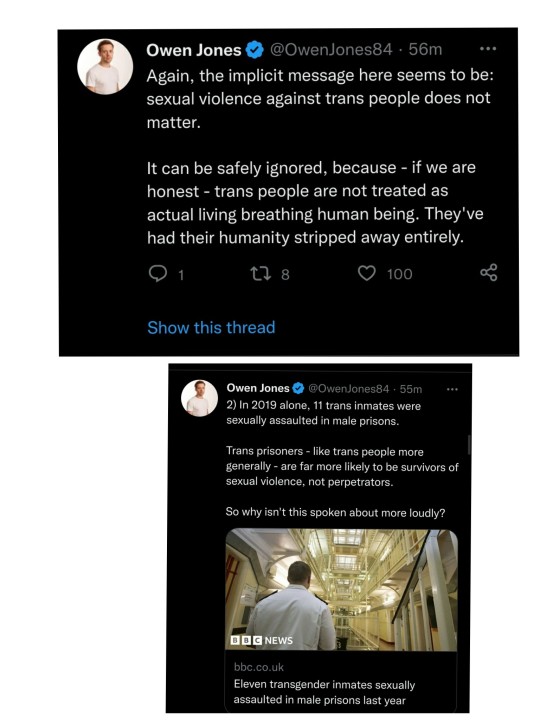
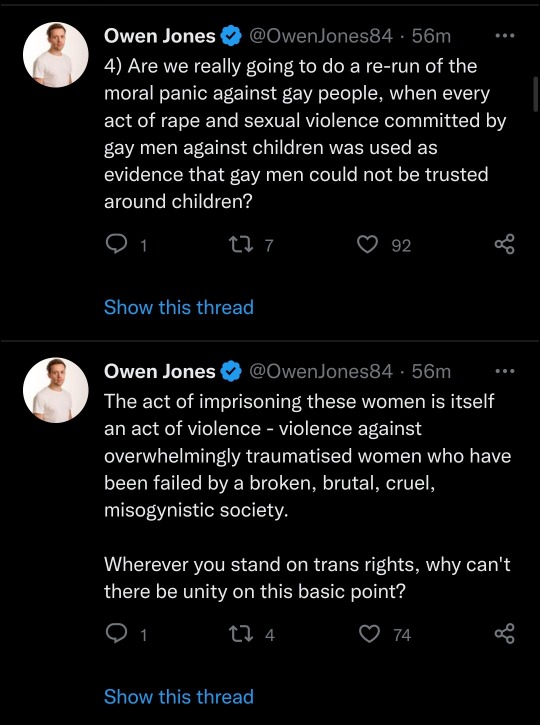
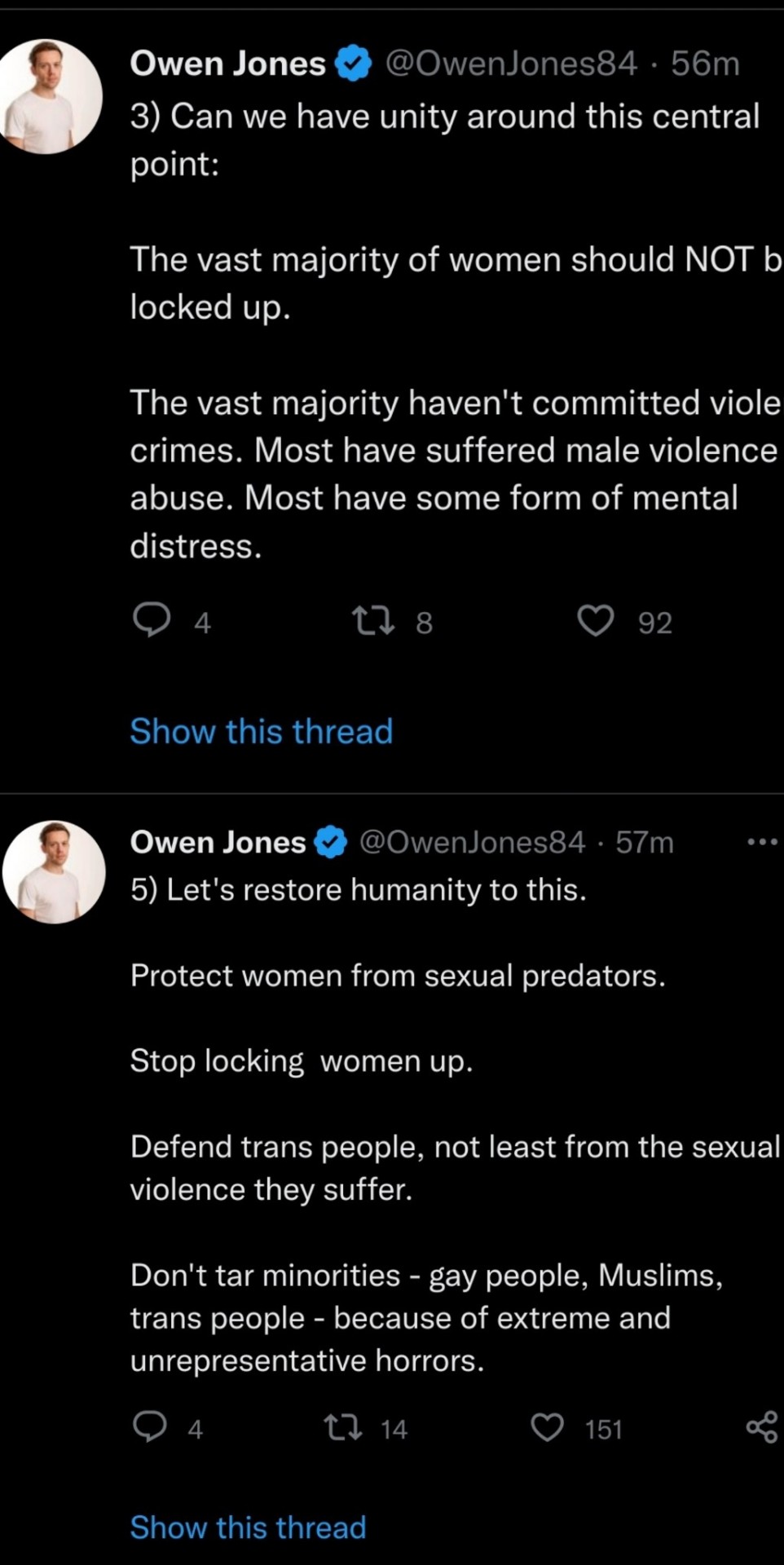
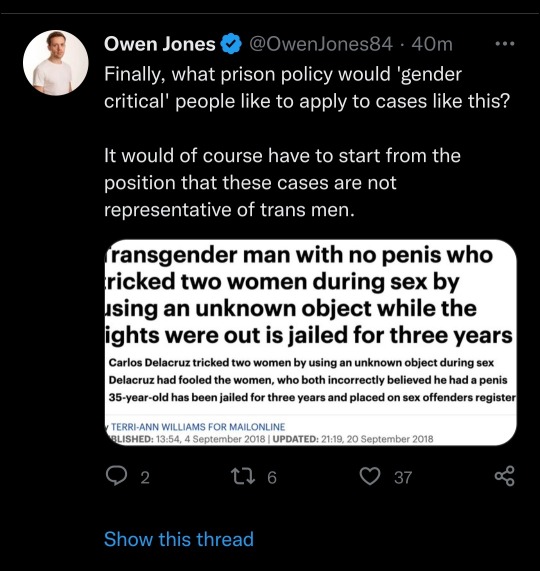
This projecting, gaslighting moron saw the news recently about the male criminal who identified as trans that was immediately transferred to women's prisons and what was his response? to NOT acknowledge the harms of trans activism or it's critical role in this bullshit being a thing, trivializing male violence against women in their own prisons, to ignore the fact that sex differences exist & that men are far stronger and more aggressive. And to suggest that it is the female population's duty to tolerate male criminals among them b/c women were made to defer! Because HIS humanity hasn't completely rotted away as if he had any sense & empathy to begin with. He definitely doesn't pull the #notallmen bullshit when it's time to hold the men who make his life harder accountable! What are crime, statistics, Jones? Why the f*ck do we collect them?
BUT he's not a misogynist! Because It has always been women's burden to tolerate and placate dangerous, pathologically self centered men like himself. The hideous smirk he's flashed in video as he's contemplated GC women being punished for having voices and his unrepentant, unceasing misogyny, lying and persistent, unrelenting attacks against anyone with any integrity tells us all we need to know.
well, here's his fucking democracy.
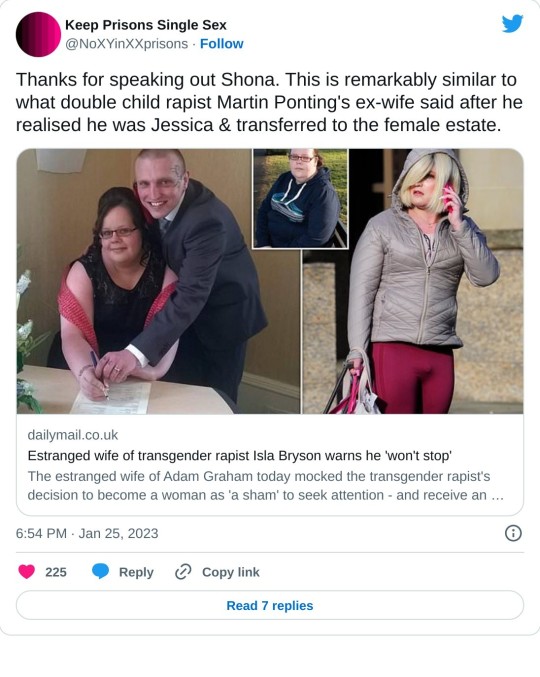
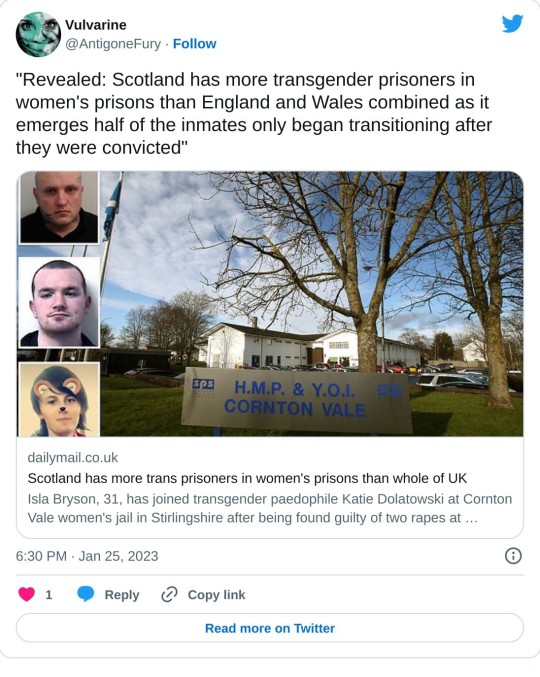
https://twitter.com/AntigoneFury/status/1618315351690731529?t=vd92vHzEQXXi3qi1_HWX8A&s=19
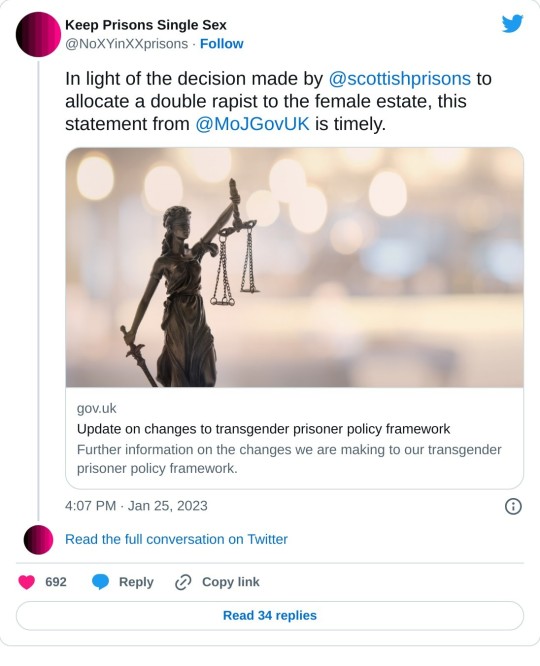
https://twitter.com/NoXYinXXprisons/status/1618279455604236289?t=q2QMi7f-87cEpYxcIYVJQA&s=19
Even if a rapist or criminal has undergone grs like Jessica Yaniv did, that doesn't suddenly make them harmless/non offenders now. Why would we allow men who have altered their body in the general population at all?
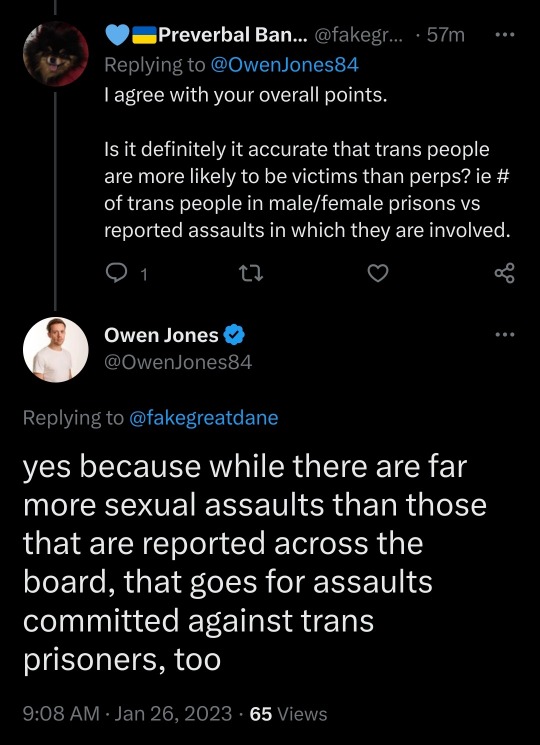
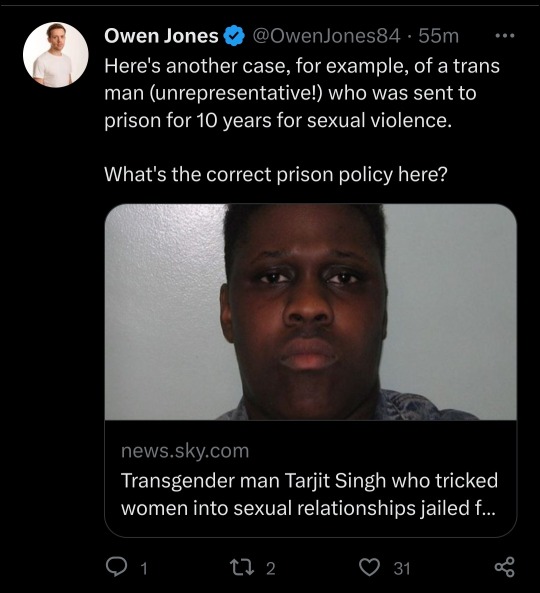
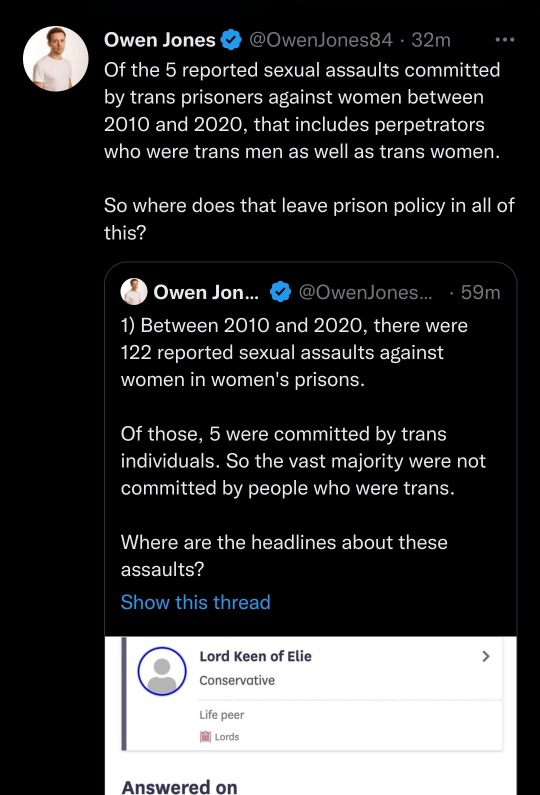
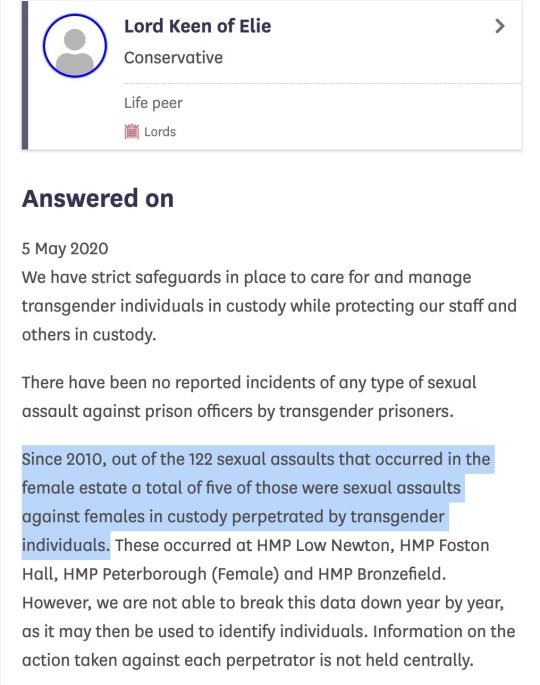
I'm curious -- since effeminate gay men, especially those who prefer to crossdress are often functionally indistinguishable from many "trans women", what does Jones suppose we should do with them? Should crossdressing men be transferred to women's prisons for their own safety as well?
The information on these five assaults is severely lacking yet he feels confident that begendered males are the same as women, regardless! They need to be transferred to female prisons for their own safety! Who cares about what the evidence says!
Is it right to ignore the SUPER vulnerable female population's boundaries, peace of mind and right to privacy from males in such a place? YES, according to Jones! 'cuz he speaks for the female prison population like he does for every other woman out there! He obviously knows more about the situation in prisons is like than them! Former prison employees have attested to the fact that female prisoners will often fail to report crimes against them or others in fear of reprisals from their abusers! Prisoners will often shield the most aggressive, dominant abusers -- imagine adding criminal men to that mix! And should not need to be said that only the most psychopathic males will want to force themselves into the female prison population to begin with! Men KNOW that women are scared of them. The ones who have a conscience would not insist that they belong among women.
He demonizes and relentlessly attacks anyone prioritizing women while a minority of dangerous, mentally ill men are being prioritized over all women and any article or media feature exploring this fact and the reality of who trans identifying men are is used as proof that the media is horrifically bigoted and anti-trans. 🙃🙃🙃
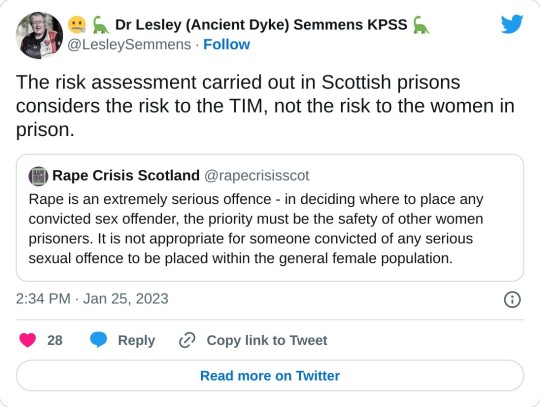
AND WHO IS RESPONSIBLE FOR THIS
55 notes
·
View notes
Text
Loki season two review – by far the best Marvel TV show in years ★★★☆☆ | The Guardian
Tom Hiddleston’s lovably narcissistic Norse god is back with Owen Wilson for a spectacular time-hopping caper that may just save the MCU from certain death

If ever there was a time for a second season of Loki, it’s now. The first outing was a witty romp through time and space, in which Tom Hiddleston’s lovably narcissistic Norse god charmed the pants off viewers. There were wild cameos (Richard E Grant as a weird alternate Loki!). There was sizzling chemistry (the bromance with Owen Wilson’s Agent Mobius!). There was even the tender blossoming of love (with Loki’s metaverse alter ego Sylvie – almost certainly the most poignant romance a TV character has ever conducted with themselves). So, naturally, the Marvel Cinematic Universe chose to follow up this televisual triumph with a disastrous series of flops, culminating in June’s Secret Invasion: a slog of a show that felt like the death knell for the franchise’s entire TV future.
[Possible spoilers ahead]
Luckily, Loki’s action-packed return suggests it is more than prepared to rise to the challenge of shaking off Marvel’s track record of TV tedium. We’re taken to the exact moment the previous season left off: the aftermath of Sylvie (Sophia Di Martino) killing He Who Remains – the shadowy figure behind temporal police the Time Variance Authority (TVA). There are slow-mo chases, car crashes in flying vehicles and Loki constantly running into effigies of He Who Remains. One thing is instantly clear: you really can’t avoid season one if you expect any of the following to make sense.
A good chunk of the opener consists of Hiddleston vanishing into another timeline. His body briefly turns into something that looks like it belongs in Stranger Things’ Upside Down, while he makes the sound of a man who has eaten some seriously out-of-date scampi. “It’s horrible,” quips Wilson’s Agent Mobius. “It looks like you’re being born, or dying – or both at the same time.” There are temporal loops, baffling causality chains and the establishment of what will be a series-long plot about stabilising a “temporal loom” – whose explanation is so convoluted the characters may as well be repeatedly chanting the word “MacGuffin”. Compared to the first season’s simple thrills, it’s all a bit overcomplicated – a disappointing choice of direction, if predictable.
Less explicable is the decision to do away with the beating heart of season one – the surprisingly lovely romance between Loki and Sylvie. This time, they’re on very separate paths, with Di Martino’s character reinvented as a time-hopping assassin, while Hiddleston moves ever further from his character’s mischievous past to buddy up with Agent Mobius in a bid to fix the McTimeWotsit. This makes for more zingtastic back-and-forth between Hiddleston and Wilson, but it robs the show of emotional heft. And with Loki proving ever less of a bad cop to Mobius’s good cop, there’s less edge to that sparkling comic chemistry too.
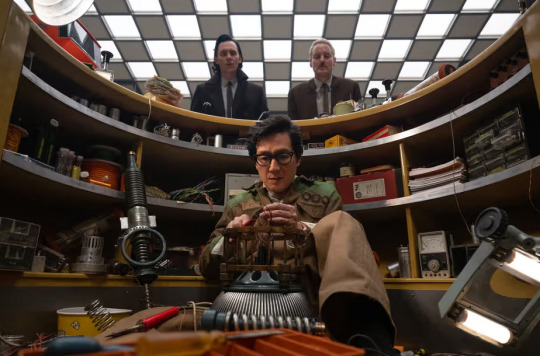
Nonetheless, the performances are as excellent as ever. Hiddleston is fantastic in every mode, from debonair to monstrous or ashen after a brutal insult from Sylvie. Di Martino is a bubbling pot of empathy, eyes constantly dewy with sadness, when she’s not spilling over into murderous rage. Wunmi Mosaku’s reprisal of her role as a TVA agent is ineffably intense – from taking down fugitives while wearing a tangerine ballgown to subjecting goofy colleagues to a Paddington-esque hard stare. And Owen Wilson is … Owen Wilson: a twinkle in the eye in human form.
When it spreads its wings, Loki’s second season manages to have plenty of fun. By episode two it feels like a time-travel thriller, with Loki and Mobius being shot into period-specific missions. There’s a retro spy caper in 70s London, our heroes suiting up like extras in Gangs of New York for a hot pursuit through 19th-century Chicago and an attempt to track down Sylvie in a 1980s McDonald’s in which romantic tension simmers over retro cash registers. The design is spectacular throughout, particularly the gloriously stylised TVA building in which every computer monitor looks like a microwave’s great grandparent, corridors are lined with tarnished aquamarine filing cabinets and even their IT guy (played by Everything Everywhere All at Once’s Ke Huy Quan) is dressed in a Ghostbusters-esque boiler suit that drips with vintage cool.
A few episodes in, things are settling into an enjoyable enough – if not tremendously exciting – groove. Then there is a gigantic cliffhanger that upends the narrative, wrongfoots the viewer and blows the show wide open. The final two instalments aren’t available for preview, so it is hard to say whether this will kickstart the show into scaling the heights of its first season. But either way, one thing is certain: this is easily the best Marvel TV series in years – for all that’s worth.
#loki#loki series#tom hiddleston#article#review#loki season 2#loki S02#owen wilson#sophia di martino#ke huy quan#wunmi mosaku#loki spoiler#loki spoilers#spoilers
12 notes
·
View notes
Note
Empathy anon. I disagree. I think that empathy =/= theory of mind and the effort to exercise it (a distinction I would think would be common knowledge in such an autistic corner of the internet!), and I think that putting healthy psychological response to stressors as a floorboard of ""good"" (let's say useful or necessary) politics kind of forecloses agency on people who are unable to access decent health /through/ oppression. Yes, there are saints in foxholes, but expecting that still feels useless and preachy. Expecting politeness (civility) is actually something I think is /more/ useful than expecting empathy because that's about external action which is what you actually metaphorically build the space to house good politics in with.
I don’t think theory of mind alone elicits compassion. Lots of people can understand why someone reacts the way they do and still do bad things—cf every insurgent who has provoked a brutal reprisal, and every military that has carried such a reprisal out.
I don’t expect it’s easy to be a saint in a foxhole. One shouldn’t be preachy about that—it would indeed be a big failure of empathy. But succumbing to cruel and punitive desires is not only morally wrong, it’s strategically incorrect. And being resigned to stupid, vicious cycles of violence or dehumanization because we refuse to ask our allies or demand our opponents to be anything better is self-defeating. I don’t accept that requiring people to be minimally self aware in these matters is denying them agency. It seems quite the opposite in fact—assuming they have a choice instead of treating them as creatures of pure reflex.
7 notes
·
View notes